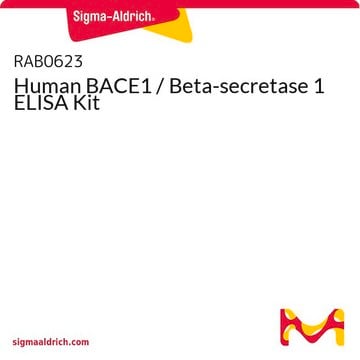CS0010
β-Secretase (BACE1) Activity Detection Kit (Fluorescent)
1 kit sufficient for 250 reactions
Synonyme(s) :
BACE1 Activity Detection Kit (Fluorescent)
Se connecterpour consulter vos tarifs contractuels et ceux de votre entreprise/organisme
About This Item
Code UNSPSC :
12161503
Nomenclature NACRES :
NA.84
Produits recommandés
Niveau de qualité
Utilisation
kit sufficient for 250 reactions
Conditions d'expédition
wet ice
Température de stockage
−20°C
Informations sur le gène
human ... BACE1(23621)
Actions biochimiques/physiologiques
BACE1 is a transmembrane protease responsible for the β site cleavage of the amyloid precursor protein (APP) to produce amyloid β peptide (Aβ). The accumulation of Aβ in the brain is a primary cause for the progression of Alzheimer′s. BACE1 is a target for inhibitor drug discovery.
Adéquation
The kit provides all the reagents required for an efficient detection of BACE1 activity. It contains an enzyme to be used for screening for potential BACE1 inhibitors. The assay is based on the fluorescence resonance energy transfer (FRET) method in which the fluorescence signal enhancement is observed after substrate cleavage by BACE1.
Composants de kit seuls
Réf. du produit
Description
- Fluorescent Assay Buffer 50 mL
- Stop Solution 15 mL
- Substrate (MOCA-SEV-NL-DAEFR-DNP-RR) 500 μL
- Assay Standard 140 μL
- BACE1 (β−Secretase) 300 units 100 μL
Code de la classe de stockage
10 - Combustible liquids
Certificats d'analyse (COA)
Recherchez un Certificats d'analyse (COA) en saisissant le numéro de lot du produit. Les numéros de lot figurent sur l'étiquette du produit après les mots "Lot" ou "Batch".
Déjà en possession de ce produit ?
Retrouvez la documentation relative aux produits que vous avez récemment achetés dans la Bibliothèque de documents.
Les clients ont également consulté
Piyoosh Sharma et al.
European journal of medicinal chemistry, 167, 510-524 (2019-02-21)
The multitarget-directed strategy offers an effective and promising paradigm to treat the complex neurodegenerative disorder, such as Alzheimer's disease (AD). Herein, a series of N-benzylpiperidine analogs (17-31 and 32-46) were designed and synthesized as multi-functional inhibitors of acetylcholinesterase (AChE) and
Fluoro-benzimidazole derivatives to cure Alzheimer's disease: In-silico studies, synthesis, structure-activity relationship and in vivo evaluation for β secretase enzyme inhibition.
Sayyad Ali et al.
Bioorganic chemistry, 88, 102936-102936 (2019-05-06)
Maricarmen Hernández-Rodríguez et al.
Molecular neurobiology, 57(9), 3979-3988 (2020-07-09)
The increase of amyloid beta (Aβ) release and hyperphosphorylation of Tau protein represents the main events related to Alzheimer's disease (AD). Furthermore, the sporadic type represents the most common form of AD. Therefore, the establishment of a non-transgenic animal model
Lucas J Gutiérrez et al.
Journal of biomolecular structure & dynamics, 37(1), 229-246 (2018-01-06)
We report in this work new substituted aminopyrimidine derivatives acting as inhibitors of the catalytic site of BACE1. These compounds were obtained from a molecular modeling study. The theoretical and experimental study reported here was carried out in several steps:
Vijay K Nuthakki et al.
Bioorganic chemistry, 90, 103062-103062 (2019-06-21)
Alkaloids have always been a great source of cholinesterase inhibitors. Numerous studies have shown that inhibiting acetylcholinesterase as well as butyrylcholinetserase is advantageous, and have better chances of success in preclinical/ clinical settings. With the objective to discover dual cholinesterase
Notre équipe de scientifiques dispose d'une expérience dans tous les secteurs de la recherche, notamment en sciences de la vie, science des matériaux, synthèse chimique, chromatographie, analyse et dans de nombreux autres domaines..
Contacter notre Service technique



![MCA-[Asn670, Leu671]-Amyloid β/A4 Precursor Protein 770 Fragment 667-676-DNP-Lys-Arg-Arg-NH2 ≥90% (HPLC)](/deepweb/assets/sigmaaldrich/product/images/375/511/f63f11a7-86de-45c4-95a0-7afa616bb265/640/f63f11a7-86de-45c4-95a0-7afa616bb265.jpg)





